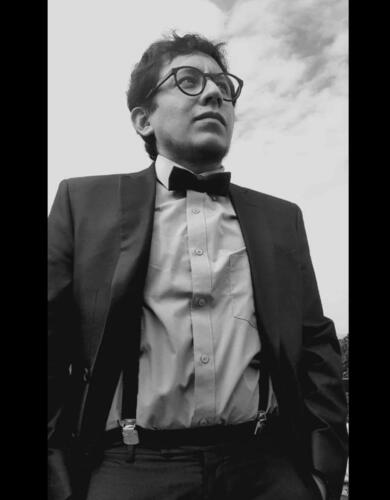Jan. 23, 2024
"Incredible experience": Visiting scientist Dr. J. Efraín Olguín, PhD, from National Autonomous University of Mexico

What is your area of study?
I am Associate Professor at Faculty of Higher Studies Iztacala (FES-I), National Autonomous University of Mexico. I coordinate the Flow Cytometry Core Facility at FES-I. I also belong to the National System of Researchers by the Mexican Council of Science in the category 1.
I teach immunology for Bachelor Medical Students. I also coordinate a topic about immunology and cancer in a PhD program of UNAM. I have 1 PhD student, 2 bachelor thesis in development, and 4 undergraduate students.
In the lab, my area of study is the role of the immune response in the tumoral microenvironment of colon cancer, which in fact is the second oncological pathology diagnosed in Mexico. We are interested in the role of the transformed epithelial cells in colon inducing a suppressor phenotype in immune cells, particularly in macrophages. We developed some studies in vitro but recently, we are part of a collaboration study to develop experiments in human samples of Mexican patients diagnosed with colon cancer.
As a coordinator of the flow cytometry core facility, I supervise the quality management system of this, because our lab is certified by the ISO: 9001-2015 norm. Finally, I also have a podcast in Spotify called “Inmunocharlas” and a YouTube Chanel with the same name; the goal of these is to teach immunology for the public in simple words.
When did you arrive at the University of Calgary, and how long will you stay?
I arrived on November 18, and I’ll leave on December 4.
How did you learn about the Snyder Institute Visiting International Scholar Grant?
During the last 15 years, Dr. Derek McKay has been a collaborator with my boss in FES-I. I also shared some results of my PhD with Dr. McKay while he was in symposiums and congress developed in Mexico. In that time, I was interested in the role of immunosuppression during infectious diseases, and Dr. McKay developed some research on it. Last year, Dr. McKay invited me to apply, and I said: why not?
How is your work at the University of Calgary impacting your research?
I’m amazed by the access of University of Calgary members to “cutting-edge” technologies, like Multiplex Ion-Beam Imaging (MIBI) and Cytometry by time of Fly (CyTOF). I’m also amazed by the skills of people responsible for these techniques. They have been very kind explaining to me all the possibilities and all the information that MIBI and CyTOF can contribute to a research project.
It is hard for Mexican researchers to access technologies such as these, mainly due to the price, the maintenance and the reagents needed to develop experiments, but maybe, in the future, the Flow Cytometry core facility of FES Iztacala could collaborate with the University of Calgary to use these technologies in the diagnosis of colon cancer in Mexican patients. But as a first step, I think that the Snyder grant has allowed me to get closer to these technologies, to see that they are functional and useful for research.
What are your future plans for your career and your research?
Next year I hope to become a full Career Professor in FES-I. I’ll be applying for the next level in the National System of Researchers by the Mexican Council of Science (level 2). Also, I’ll apply for a Mexican research grant and probably I will become a tutor of master’s degree students. In fact, the Snyder Grant helped me with the curriculum for these applications. Finally, I think that next year will be great for publishing two papers about my research in colon cancer.
As a researcher from a developing country, I’m very grateful for the opportunity that the Snyder Visiting Scholar Grant gave, allowing me to work with such cutting-edge technologies. Also, I have felt very supported by Dr. McKay; he is a very kind person. I suggest that junior professors of developing countries should have this incredible experience.
